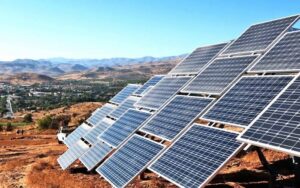Exploring solar energy potential in Nigeria may be the way to go as Africa’s largest country battles chronic epileptic power supply.

Nigeria spends the greater part of the night in darkness. As the epileptic power supply characterizes the country, one may ask can renewable energy in Nigeria be an adaptable solution to the country’s power problem? What is Solar energy potential in Nigeria? These pressing questions are answerable if government, organizations, and individuals shift their focus from non-renewable to renewable energy in Nigeria.
With a population larger than any other country in Africa, Nigeria is a big market. Such a big market will require an adequate power supply to ensure the smooth running of industries. Nigerians on most occasions are traditionally adapted to gas turbines, hydroelectric and fossil fuel. This is given the county’s abundant free flowing rivers which are massive enough to power electricity. Also Nigerians gas deposit which is the largest in Africa also pushes the country towards gas and hydroelectric as the country’s primary means of electricity generation.
What is Nigeria’s Solar Energy Potential?
Nigeria has huge solar energy potential, it has been said earlier that the Sahara desert has enough potential to power the whole world if equipped with the appropriate massive solar infrastructure. However we are not thinking about powering the whole world from the Sahara desert but since we don’t have the capacity or interest to even engage in such a massive solar project, an accurate estimate of what quantity of electricity we can actually generate from a solar focused energy model will be hard.
When we talk about renewable energy in Nigeria, our primary focus is on solar energy. This is given how sunny it can get in several parts of Nigeria, especially the vast North. While huge solar farms may need government intervention at the federal, state, and local government levels, individuals can embark on personal small to medium-scale solar-powered electricity projects that can take advantage of the sunlight to create renewable energy in Nigeria. Energy sources like solar are not seeing massive use despite the country having huge potential for solar energy.
Solar installation for homes and small business
Currently, in Nigeria, homes and small-scale enterprises constitute the largest patronage of the solar power market. Several homes and enterprises like barber shops have installed medium solar-powered batteries with their feeder panels. This provides a cheap alternative to energy supply. The solar panels in homes and these small-scale enterprises augment the electricity supply. Most solar power batteries can also be charged by regular electricity. This makes it even more interesting as with a combination of solar and regular electricity, enterprises and homes can experience a near-stable power supply.
Long and Short-term cost of solar installations for homes and small business
When it comes to undertaking any project, cost is a very huge focus. Considering the solar energy potential in Nigeria, the cost of solar installation for small businesses and homes is cheaper both in the short and long term. It also offers other advantages. When cost is the question, while installation may be more costly than say buying a generator set, the long-term benefits outweigh procurement cost.
It may cost around N1,000,000 (one million naira) today to install a sizable solar panel unit with accompanying batteries. In comparison to a generator set that may power similar homes, N350,000 (three hundred and fifty thousand naira) can provide sufficient coverage however the long-term cost is the difference.
For a generator set especially since the removal of petrol subsidy in Nigeria, about N3500 worth of petrol may be required daily for about 10 hours uptime. This won’t be the case with your solar installations. Also, long-term maintenance is more common with petrol generator sets.
Apart from the cost difference, solar energy also has the advantage of less pollution both noise pollution and harmful chemical output. Solar is also better for the environment and global warming as it doesn’t release much volume of such harmful substances to the environment.
A worsening power crisis given subsidy removal and the urgent need to explore Nigeria’s solar energy
Since the removal of the petrol subsidy, Nigeria has never been the same. Electricity supply is one of the worst-hit sectors. Nearly half of the time in Nigeria, Nigerians relied on petrol generators. Even when the subsidy was more effective and petrol was cheaper, petrol generators were more costly. Now that subsidy is partially or fully gone, things have become a bit tougher when it comes to powering homes and enterprises.
There’s a deteriorating power crisis that is often worsened by the collapse of the power grid. In the reality of these terrible power situations, only a different approach to power generation and supply will make a sustainable impact.
Conclusion
Governments, organizations, and individuals need to embrace renewable energy. A long-term energy goal needs to be implemented by the government. Individuals need to also shift their dependence on petrol generators and integrate solar energy as a critical aspect of home and enterprise powering solutions.
Apart from the cost advantage of solar energy especially in the long term, they are also easier to maintain and generate less pollution. All these create a solution that’s both pocket and environmentally friendly. Solar energy projects can be undertaken by individuals and we encourage more individuals to switch to solar energy as it offers several benefits and cheap clean energy.
You May also Want to Read: Food Inflation in Nigeria; The Way to Survival
 Home
Blog
Home
Blog